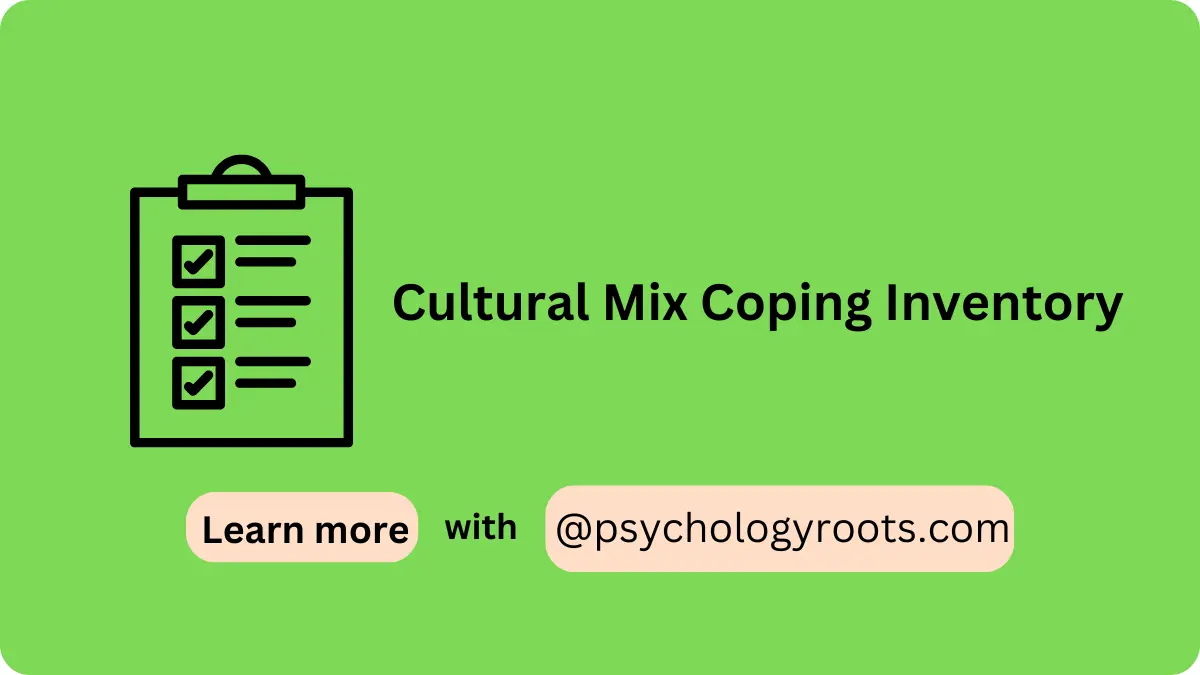Table of Contents
Cultural Mix Coping Inventory
Here in this post, we are sharing the “Cultural Mix Coping Inventory”. You can read psychometric and Author information. We have thousands of Scales and questionnaires in our collection (See Scales and Questionnaires). You can demand us any scale and questionnaires related to psychology through our community, and we will provide you with a short time. Keep visiting Psychology Roots.
About Cultural Mix Coping Inventory
Scale Name
Cultural Mix Coping Inventory
Author Details
Frank Quansah, John Elvis Hagan Jr., James Boadu Frimpong, Medina Srem‑Sai, Edmond Kwesi Agormedah and Francis Ankomah
Translation Availability
English

Background/Description
The Cultural Mix Coping Inventory (CMCI) is a psychological tool designed to assess coping strategies employed in culturally diverse and stressful situations. The tool aims to measure how individuals adapt and manage stress when interacting with individuals from different cultural backgrounds.
Developed and validated by Quansah et al. (2022), the CMCI uses multidimensional item response theory (MIRT) to ensure accurate and reliable measurements. It is especially relevant in contexts such as education, workplaces, and other multicultural environments where stress from cultural diversity can affect performance and well-being.
Key dimensions of the inventory include:
- Problem-focused coping: Strategies aimed at resolving the stressor.
- Emotion-focused coping: Strategies aimed at managing emotional distress.
- Cultural adaptation coping: Strategies for adjusting to cultural differences.
Administration, Scoring and Interpretation
- Preparation: Ensure access to the inventory and scoring guidelines.
- Introduce the purpose: Explain that the CMCI evaluates coping strategies in culturally diverse stressful situations.
- Instructions: Provide clear instructions on how to respond to each item, emphasizing honesty.
- Setting: Administer in a comfortable, distraction-free environment.
- Duration: The inventory typically takes 15–20 minutes to complete.
- Scoring: Use the provided scoring manual to interpret results, focusing on individual and group coping profiles.
Reliability and Validity
- Reliability: The CMCI demonstrates high internal consistency (Cronbach’s alpha > 0.85) across its dimensions, ensuring reliability for diverse populations.
- Validity: Psychometric evaluation using multidimensional item response theory supports the tool’s construct validity, confirming its effectiveness in measuring coping mechanisms in multicultural stress contexts.
Available Versions
16-Items
Reference
Quansah, F., Hagan Jr, J. E., Frimpong, J. B., Srem-Sai, M., Agormedah, E. K., & Ankomah, F. (2022). Psychometric properties of the cultural mix coping inventory for stressful situations using physical education teachers: a multidimensional item response theory analysis. BMC psychology, 10(1), 209.
Important Link
Scale File:
Frequently Asked Questions
Q1: What is the Cultural Mix Coping Inventory (CMCI) used for?
The CMCI assesses coping strategies used in culturally diverse and stressful situations.
Q2: Who can use the CMCI?
Researchers, educators, mental health professionals, and organizational psychologists can use it to understand and improve coping strategies in multicultural settings.
Q3: How is the CMCI structured?
The inventory focuses on three main dimensions: problem-focused coping, emotion-focused coping, and cultural adaptation coping.
Q4: Can the CMCI be applied globally?
Yes, the CMCI is adaptable to various cultural contexts and populations.
Q5: Is the CMCI suitable for organizational use?
Yes, it can be used in workplace diversity programs to improve coping strategies and cultural adaptability among employees.
Disclaimer
Please note that Psychology Roots does not have the right to grant permission for the use of any psychological scales or assessments listed on its website. To use any scale or assessment, you must obtain permission directly from the author or translator of the tool. Psychology Roots provides information about various tools and their administration procedures, but it is your responsibility to obtain proper permissions before using any scale or assessment. If you need further information about an author’s contact details, please submit a query to the Psychology Roots team.
Help Us Improve This Article
Have you discovered an inaccuracy? We put out great effort to give accurate and scientifically trustworthy information to our readers. Please notify us if you discover any typographical or grammatical errors.
Make a comment. We acknowledge and appreciate your efforts.
Share With Us
If you have any scale or any material related to psychology kindly share it with us at psychologyroots@gmail.com. We help others on behalf of you.